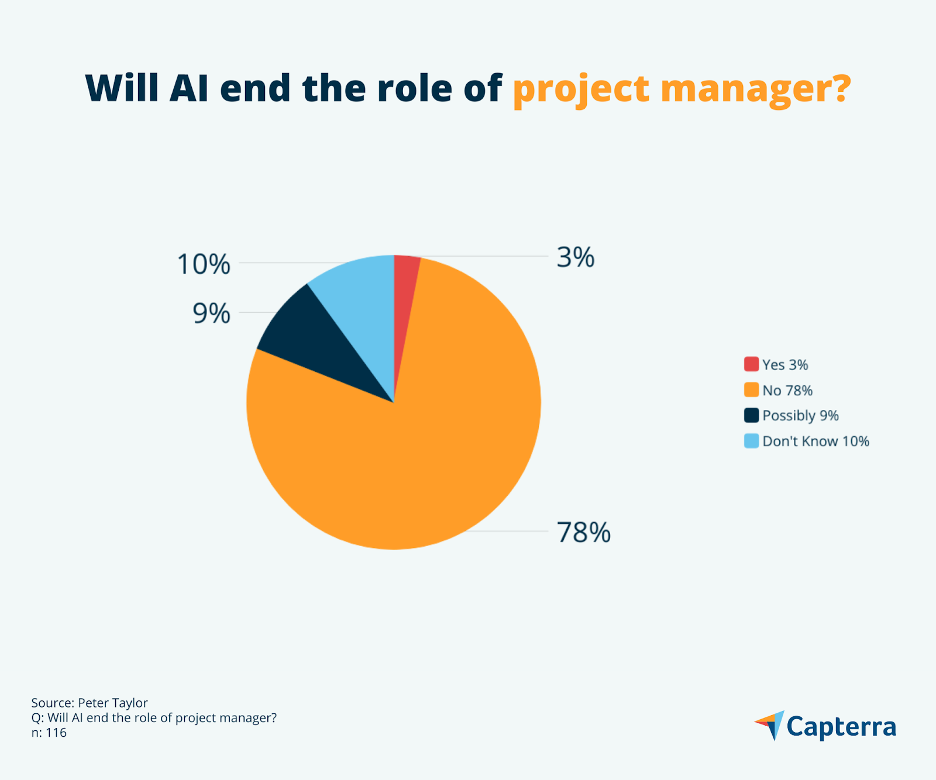Instead of artificial intelligence serving as a threat to project managers, we’ll explore how it can be an aid for a valuable partnership.
Artificial intelligence (AI) has opened up a torrent of projects and possibilities, helping organizations reimagine how we live, work and play. And it’s happening at a rapid clip. According to a Gartner survey,* 80% of executives think that automation can be applied to any decision. But what about the impact on project delivery and project management?
It seems unlikely to be minimal: Gartner says that 80% of project management tasks will be eliminated by 2030 as artificial intelligence takes over[1].
Let that sink in for just a few moments. If you are a project leader, 80% of what you do today you won’t be doing in just seven years’ time (if not earlier). What will you be doing instead? Will it still be in project management?
The big question for project managers
Now that is a big change. A momentous change. A scale of change that most project managers have never experienced in their working life.
The overwhelming question I hear asked at the many conferences and events I attend and speak at is, "Will AI be an aid or a threat?"
I've explored this question in my book "AI and the Project Manager: How the Rise of Artificial Intelligence Will Change Your World."
As part of the research for that book I interviewed project managers around the world and there was a common inconsistency in thoughts around AI and the project management profession. Here are just as couple:
"Project management is all about leading people towards pre-defined goals. AI will not be capable of leading people in any foreseeable future."
"I am intrigued at the potential of AI in project management but welcome any automated process that will help reduce the manual legwork of project personnel to manage, control, monitor, evaluate, and report on portfolio, programme, and project progression."
I also ran a survey** to gather further insight about the future, or perhaps non-future, of my profession:

A small percentage (3%) believe that indeed AI will (eventually) remove the need and role of the project manager completely, and a few more (10%) feel that this could possibly be the "endgame" of the rise of AI into the world of project management.
But 78% feel that there is still a future for project managers (and project management), which I personally never doubted—we just need to find the best application and partnership.
Practical application and benefit
All viewpoints may well be true to some extent but, in practical terms, what will this mean to a typical project manager running a non-typical project?
How will this opportunity translate into a true project aid rather than a threat to the role of the project manager?
And what actionable steps can project managers take to both prepare for this transformation of their profession and to reduce manual or time-consuming tasks through the adoption of automation? At the 2022 PMI Global Summit in Las Vegas, I presented on this very topic and ran a poll within my session. Some 145 attendees participated in a Menti poll which gave the encouraging output of over 50% who were excited about the arrival of AI into the project management world, and only 7% were either concerned or worried about the potential impact.
I further spoke to the future state of AI being the digital partner for project managers and that it could offer support and guidance in many areas from project scheduling to resource management and communication. The feeling in the room from the audience was that AI could be helpful in many ways—the only challenge would be finding the right way to partner to deliver the best level of support for busy project managers.
It has always been essential for project leaders to have strong communication, negotiation skills and, more popularly accepted these days, emotional intelligence, to inspire teams and lead them in a collaboratively productive manner.
AI, through this digital partnership, should allow project managers to focus more on this project leadership skill set and leave the non-people aspects of project management to the artificial intelligence for the most part.
Is AI and project management a valuable partnership?
Perhaps, to answer, or at least begin to answer that question, we all need a little more insight and understanding of what makes up artificial intelligence (AI).
There are four main categories of AI:
Project management process automation
Project assistant style chatbots
Project intelligence through machine learning
The future state of the autonomous project manager
Process automation
Also known as business process automation, this is the ability to coordinate and integrate tools, people, and processes through a defined workflow.
It aims to reduce human errors, enable faster responses to issues and decision-making, and to allow a more efficient allocation of resources for greater overall efficiency. It also does this across a full portfolio landscape taking into account the maximum amount of data available for greater insight and a more balanced output.
Examples might be enabling auto-scheduling by means of programmed logic and rules, and automatically tracking the progress and status of tasks performed by project team members and alerting a (human) project manager for intervention only by exception.
Chatbots
A chatbot is a software application used to conduct an online chat conversation via text or text-to-speech, in lieu of providing direct contact with a live human agent. It can automate conversations and interact with people through messaging platforms.
At the heart of chatbot technology lies natural language processing or NLP, the same technology that forms the basis of the voice recognition systems used by virtual assistants such as Google Now, Apple’s Siri, and Microsoft’s Cortana.
We are all probably most aware of chatbots through interaction with such technology, and with the delight of "chatbotting" our way through a customer support system when something has gone wrong with a service or product.
Chatbots in project management can act as project assistants interacting with the (human) project manager in human-computer interaction, based on speech or text recognition and will be able to take over menial tasks such as organizing meetings, progress management tracking, and team reminders.
Machine learning
Machine learning enables predictive analytics and can provide advice to the (human) project manager on how to guide the project given certain parameters or how to respond to issues and risks, always with the driving purpose of reaching the best possible outcome for the project.
There are four strands of learning for ML:
Supervised learning (data is labeled and the algorithm is trained to correlate each dataset with the labeled result—diagnosing x-ray results).
Unsupervised learning (data is not labeled but with a sufficient number of indicating guides the AI algorithm will be able to classify data correctly—clustering DNA patterns to analyze evolutionary biology).
Reinforcement learning (the algorithm learns through trial and error to make predictions – AI agents are used by Deepmind to cool Google Data Centers, taking snapshots of data every five minutes and feeding this to deep neural networks to predict how different combinations will affect future energy consumptions)[2].
Rules-based learning (this involves capturing a set of rules that represent all the knowledge about the data set—an expert system might help a doctor choose the correct diagnosis based on a grouping of symptoms).
The autonomous PM
Think of those self-driving cars, autonomous vehicles. An autonomous project manager system would only need limited input from a human (presumably an experienced project manager). Mostly it would be self-sufficient due to the application of a range of AI technologies, a learning program suite, and real-time data inputs contrasted to historical project data.
As it stands, there are currently no real-life examples of fully autonomous project management, so don’t feel too threatened!
3 big asks for PMs
With regards to the whole AI and project management issue, we should ask ourselves two questions:
What are the project managers of the immediate future going to do?
And regarding the application of time freed by AI dealing with the 80% of current tasks, how will project managers re-focus their efforts?
The answer to both is simple I believe: People deliver projects.
So, I believe, project managers in the "new AI normal" world will:
Use all that AI insight and predictive capability and re-align their day-by-day efforts in the direction of people.
That amazing 80% saving of effort provided by the intelligent application of AI will free up project managers to really get to grips with the complexities of people and teams.
And what is (I strongly believe) the next quantum leap in project success: building and leading incredible project teams, anywhere and everywhere that they are individually located, into a single, purpose-driven powerhouse.
Having led some of the largest PMOs in the world, I recognize the value gap of the almost untouched area of project team performance management. It is about ensuring greater alignment amongst project team members knowing that projects are about people, and people (teams) deliver project success.
I explore this further in my article "Artificial Intelligence and the Future of Project Management."[2]
But, for now, to give my personal answer to the question, ‘Is artificial intelligence a threat or an aid to project managers’? I think it is a clear "aid" if we partner with AI in the right way, and we prepare for this change today.
Check out these recent articles for more insights into project management:

